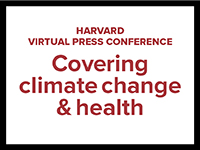Harvard press conference on climate & health


Climate & human health fellow,
Harvard C-CHANGE

Director,
Harvard C-CHANGE

Communications director,
Future Coalition
How climate change affects our health — and how can we cover it
The disproportionate number of COVID-19 fatalities in minority populations, particularly among African Americans, is linked to how adverse environmental effects puts them at risk.
That was one of the insights from Dr. Aaron Bernstein, pediatrician and director of Harvard’s Center for Climate Change, Health and the Global Environment, during the April 8, 2020, virtual press conference, sponsored by Associated Collegiate Press and National Scholastic Press Association.
Bernstein and Dr. Caleb Dresser, a climate and health fellow at Harvard C-CHANGE, joined climate activist Dylan Barnard in the press conference.
Dresser described four instances of how climate change is affecting American health, and Barnard described how this year’s virtual events will mark the 50th anniversary of Earth Day, on April 22.
Watch their one-hour press conference here.
Virtual press conference speakers
Dr. Aaron Bernstein
Bernstein is the interim director of The Center for Climate, Health, and the Global Environment at the Harvard T.H. Chan School of Public Health (Harvard C-CHANGE), a pediatrician at Boston Children’s Hospital, and an Assistant Professor of Pediatrics at Harvard Medical School.
Dr. Bernstein focuses on the health effects of the climate crisis on children’s health and advancing solutions to address its causes to improve the health and wellbeing of children around the world.
In 2019, Dr. Bernstein testified before Congress on the child health impacts of climate change, drawing from his personal experience as a pediatrician having to treat children with breathing difficulties, vector-borne diseases, and trauma from natural disasters. He is a trusted voice for major news outlets, providing interviews and expertise to reporters from The New York Times, The Wall Street Journal, NBC News, CNN, and The Guardian, and writing articles for the New England Journal of Medicine, the British Medical Journal, and the Boston Globe, among others.
With Nobel Laureate Dr. Eric Chivian, Dr. Bernstein co-authored and co-edited the Oxford University Press book, Sustaining Life, which received the distinction of best biology book of 2008 from the Library Journal, and which has been published in several foreign language editions.
At Harvard, he is the course director for Human Health and Global Environmental Change and created the HarvardX course “The Health Effects of Climate Change” which explores how climate change influences health through its effects on air quality, nutrition, infectious diseases, and human migration as well as solutions to the climate crisis. Through this course, thousands of students from over 100 countries have learned how climate change directly impacts their lives, and what they can do to become part of the solution.
Dr. Caleb Dresser
Dresser is a Climate and Human Health Fellow working with the Center for Climate, Health, and the Global Environment at Harvard T.H. Chan School of Public Health (Harvard C-CHANGE) to understand and enhance approaches to health risks during and after extreme weather events.
Dresser’s current work focuses on the means to address health needs during and after climate-related disasters. He is currently exploring the hazards posed by extreme heat events and weather-related electrical outages for patients in communities near Boston, including the threat that these can pose to patients with specific medical vulnerabilities.
He is also examining the long-term health impacts of hurricanes and other climate-related disasters, including issues of prolonged loss of access to medical services and temporary and permanent migration of affected populations.
